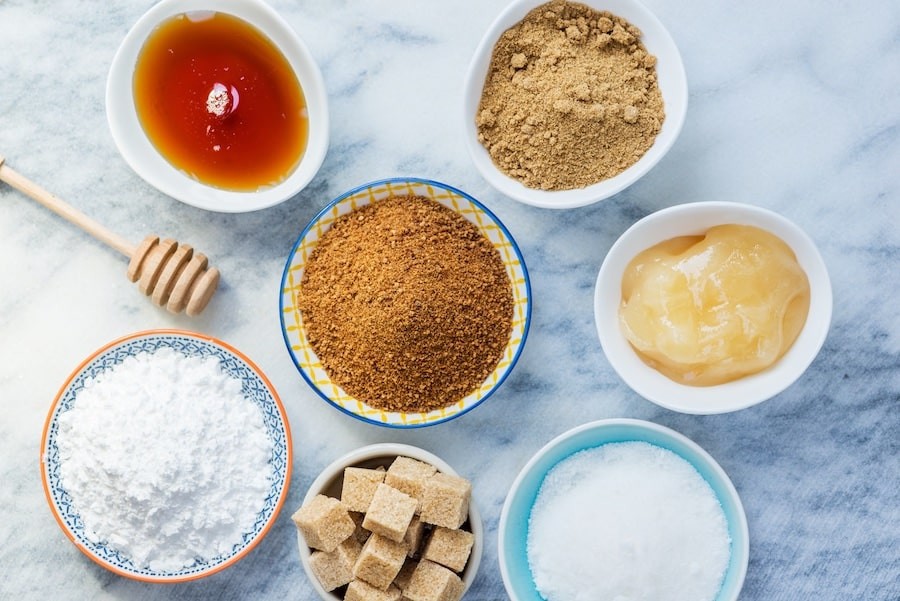5 sugar substitutes for people living with diabetes

There is a large variety of sweeteners and sugar substitutes that are great alternatives for limiting the effect on blood glucose. Here is a list of sugar substitutes you can use to sweeten food and drink when making your favourite recipes.
Diabetes: what types of sugar are there?
Sucrose, the sugar more commonly known as "table sugar" or refined sugar, is highly appreciated for its taste, but is not so good from a nutritional point of view.
Whether you’re living with diabetes or not, it is recommended to limit the consumption of sucrose, especially between meals. You can use a wide range of alternatives with similar or lower calorific content, such as sweeteners.
However, please remember , in case of hypoglycaemia, your favourite sweet snack should always be on hand to help such as orange juice or jelly babies.
Sugar substitutes
Honey
Composed mainly of water, fructose, and glucose, honey is an excellent natural substitute for regular refined sugar. Thanks to its high fructose, mineral, and flavonoid content, it has anti-oxidant and anti-inflammatory properties, whilst having a lower glycaemic index (GI) and energy value than refined white sugar.
Stevia
Stevia is a natural sweetener containing no calories. It is one of the healthiest alternatives to refined white sugar. It has an intensely sweet taste and its consumption does not cause glycaemic spikes. It has all the advantages of regular sugar, with none of the disadvantages!
Stevia is particularly recommended for type 2 diabetes, as it does not affect blood glucose levels, your lipid profile, or bodyweight. It also has antioxidant and anti-inflammatory properties. It is easy to understand why Stevia has been used since ancient times as a sweetener and a medicinal plant!
Synthetic sweeteners and imitation sugars
Synthetic sweeteners, also known as "artificial sweeteners", are ideal for people with diabetes looking for a good alternative to regular refined sugar. As food additives, they mimic the taste of sugar [1,7,9]. The main advantages? They either contain fewer calories than regular sugar or none at all and do not raise blood glucose levels.
The main artificial sweeteners are:
- sucralose (E955);
- aspartame (E951);
- neotame (E961);
- saccharine (E954);
- cyclamate (E952);
- acesulfame potassium (E950) [1,2,7,8,9].
The best-known sweeteners, sucralose, and aspartame, are respectively 600 times and 200 times sweeter than regular sugar. They therefore make it possible to reduce overall quantities used. However, these imitation sugars have no energy value, and are devoid of nutrients.
Coconut sugar
Coconut sugar has a low GI (35) and is a good natural alternative to regular refined sugar. Made from coconut palm sap, it contains large quantities of vitamins and minerals. Coconut sugar looks, tastes, and melts almost exactly like regular sugar and can be used in most situations.
Agave syrup and maple syrup
Agave syrup and maple syrup are two other possible alternatives to regular sugar for people with diabetes. They are both good natural sweeteners and have the merit of having a lower GI than regular refined sugar and being more nutritional. They are mainly composed of fructose, recognised for its reduced hyperglycaemic effect. Agave and maple syrups are ideal for baking.
References
- Megha Gupta. Sugar Substitutes: Mechanism, Availability, Current Use and Safety Concerns-An Update. Open Access Maced J Med Sci. 2018 Oct 19;6(10):1888-1894. doi: 10.3889/oamjms.2018.336. eCollection 2018 Oct 25.
- Alison Gray, Rebecca J Threlkeld, Kenneth R Feingold, Bradley Anawalt, Alison Boyce, George Chrousos, Wouter W de Herder, Kathleen Dungan, Ashley Grossman, Jerome M Hershman, Hans J Hofland, Gregory Kaltsas, Christian Koch, Peter Kopp , Márta Korbonits , Robert McLachlan, John E Morley , Maria New, Jonathan Purnell, Frederick Singer, Constantine A Stratakis , Dace L Trence , Don P Wilson, editors. Nutritional Recommendations for Individuals with Diabetes. In: Endotext [Internet]. South Dartmouth (MA): MDText.com, Inc.; 2000–. 2019 Oct 13. PMID: 25905243. Bookshelf ID: NBK279012.
- Choo VL, Viguiliouk E, Blanco Mejia S, Cozma AI, Khan TA, Ha V, Wolever TMS, Leiter LA, Vuksan V, Kendall CWC, de Souza RJ, Jenkins DJA, Sievenpiper JL. Food sources of fructose-containing sugars and glycaemic control: systematic review and meta-analysis of controlled intervention studies. BMJ. 2018 Nov 21;363:k4644
- Erejuwa OO, Sulaiman SA, Wahab MS. Honey - A novel antidiabetic agent. Int J Biol Sci. 2012;8(6):913-34.
- Bobiş O, Dezmirean DS, Moise AR. Honey and Diabetes: The Importance of Natural Simple Sugars in Diet for Preventing and Treating Different Type of Diabetes. Oxid Med Cell Longev. 2018 Feb 4;2018:4757893.
- Erejuwa OO, Sulaiman SA, Ab Wahab MS. Honey: a novel antioxidant. Molecules. 2012 Apr 12;17(4):4400-23.
- Szimonetta Lohner, Daniela Kuellenberg de Gaudry, Ingrid Toews, Tamas Ferenci, Joerg J Meerpohl. Non-nutritive sweeteners for diabetes mellitus. Cochrane Database Syst Rev. 2020 May 25;5(5):CD012885. doi: 10.1002/14651858.CD012885.pub2.
- Marjan Ajami, Maryam Seyfi, Fatemeh Abdollah Pouri Hosseini, Parisa Naseri, Aynaz Velayati, Fahimeh Mahmoudnia, Malihe Zahedirad, Majid Hajifaraji. Effects of stevia on glycemic and lipid profile of type 2 diabetic patients: A randomized controlled trial. Avicenna J Phytomed. Mar-Apr 2020;10(2):118-127.
- Craig A Johnston, Brian Stevens, John P Foreyt. The Role of Low-calorie Sweeteners in Diabetes. Eur Endocrinol. 2013 Aug;9(2):96-98. doi: 10.17925/EE.2013.09.02.96. Epub 2013 Aug 23.
- Muhammad Tuseef Asghar, Yus Aniza Yusof, Mohd Noriznan Mokhtar, Mohammad Effendy Ya'acob, Hasanah Mohd Ghazali, Lee Sin Chang, Yanty Noorzianna Manaf. Coconut ( Cocos nucifera L.) sap as a potential source of sugar: Antioxidant and nutritional properties. Food Sci Nutr. 2019 Sep 30;8(4):1777-1787. doi: 10.1002/fsn3.1191. eCollection 2020 Apr.
- Ozuna C, Trueba-Vázquez E, Moraga G, Llorca E, Hernando I. Agave Syrup as an Alternative to Sucrose in Muffins: Impacts on Rheological, Microstructural, Physical, and Sensorial Properties. Foods. 2020 Jul 8;9(7):895.
- Sato K, Nagai N, Yamamoto T, Mitamura K, Taga A. Identification of a Novel Oligosaccharide in Maple Syrup as a Potential Alternative Saccharide for Diabetes Mellitus Patients. Int J Mol Sci. 2019 Oct 11;20(20):5041.


